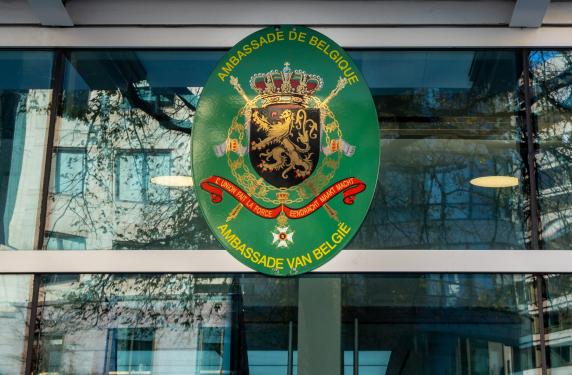-
Last updated on
Belgium strives for a peaceful and secure world where poverty is a thing of the past and where there are development opportunities for all. Our efforts therefore complement those of the international community to achieve sustainable development and a fair world. Read more about the Belgian Development Cooperation on www.dg-d.be
Uganda-Belgium Partnership
Uganda suffered decades of political troubles until the 1990s. Since then, the country has made great efforts to preserve political stability, peace and an annual economic growth of around 7%.
The cooperation between Belgium and Uganda goes back to 1995, when a Memorandum of Understanding was signed. The first Indicative Cooperation Programme (ICP) ran from 2005 to 2008, and primarily focused on health care and the strengthening of decentralization. The following cooperation programmes, for the 2009-2012 and 2013-2016 periods, concentrated on two sectors: education and health. These contributed to the Poverty Eradication Action Plan (2004-2009), the National Development Plan (2010-2015) and to achieving the Millennium Development Goals of Uganda.
The cooperation between Belgium and Uganda, as the 6th biggest beneficiary of Belgian development aid in the world, rests on 6 pillars through which it implements its programmes.
The six pillars of Belgian Development Cooperation in Uganda
1. The Bilateral Cooperation Program
The projects and programmes of the Bilateral Belgian Cooperation are implemented by Enabel, the Belgian Development Agency. It focuses on secondary technical and professional education and on primary healthcare. The total budget of the current programme amounts to 69 million euro, channeled through the following projects:
Health sector
- Establishing a Financial Mechanism for Strategic Purchasing of Health services in Uganda (SPHU)
- Institutional Support for the Private-non-for Profit (PNFP) Health Sub-sector to Promote Universal Health Coverage in Uganda
Education sector
- Improving the Training of Secondary Teachers in National Teacher’s College Mubende, Kabale, Kaliro and Muni (TTE)
- Support to the Implementation of the Skilling Uganda Strategy (SSU)
Multisectoral
- Support to the Beneficiary Institutes to the Skills Development of their Human Resources in Uganda (SDHR)
- Belgo-Ugandan Study and Consultancy Fund
For more information about the projects and programmes of the Bilateral Belgian Cooperation in Uganda, visit:
- www.enabel.be/content/enabel-uganda
- open.enabel.be/en/projects
- openaid.be/en/active-projects?recipient_country=3236&sdg=All&field_activity_status_target_id=1
2. The Multilateral Cooperation Program
Support in a broad range of sectors is provided in the form of financing UN agencies and other institutions. Currently Belgium supports 15 multilateral organizations worldwide, all of them are active in Uganda. The biggest part of the Official Development Aid of Belgium in the world (20%) goes to the European Union (EU).
3. The Non-Governmental Cooperation Program
Belgium currently supports the following 11 Belgian Non-GovernmentalActors (NGAs) working in Uganda, with a total budget of 23 million euro (2017-2021).
- Africalia – Through the Bayimba Foundation it focuses on uplifting arts and culture in Uganda through cultural exchange and creativity.
- Avocats sans Frontières – Provides legal assistance and promotes legislative reforms designed to increase respect for human rights.
- Broederlijk Delen – Works together with local partners on sustainable agriculture and the promotion of a strong local economy.
- BOS+ – Focuses on forest conservation and sustainable forest management.
- Iles de Paix – Aims to reinforce the production, organization and environmental management capacity of farming families in the Kabarole and Kamwenge districts.
- PROTOS (Join For Water) – Works to improve the access to sustainable solutions for drinking water, sanitation and hygiene, or water for agriculture. Currently they are mainly active in the Mpanga basin and in a new zone near Lake Albert.
- Trias – Mainly active in Western Uganda and Kampala, its mission is to improve livelihood security and the wellbeing of family farmers and small-scale entrepreneurs.
- Rikolto – Aims to transform the horticulture sector through inclusive business models in Eastern Uganda and supports Uganda to have strong, competitive, sustainable rice markets.
- Vétérinaires sans Frontières – Supports animal healthcare and family livestock farming in the Karamoja region.
- VVOB – Works within the framework of the Teacher Training Education Project to design a teacher trainer professional development programme on Active Teaching and Learning.
- VLIR-UOS – Supports partnerships between universities and university colleges and stimulates academic cooperative projects.
4. Humanitarian Aid
Humanitarian aid is provided through different programmes of international organizations (UNHCR, OCHA, WFP, ICRC,…) and NGOs (Rode Kruis Vlaanderen, Oxfam, Médecins du Monde,…). Over the past years an average of 170 million euro per year of the Development Aid of Belgium in the world was allocated to humanitarian aid.
5. BIO - Belgian Investment Company for Developing Countries
The mission of the Belgian Investment Company for Developing Countries is to support a strong private sector in developing and emerging countries by investing in small and medium-sized enterprises and making structural contributions to the socio-economic growth. In Uganda, BIO is present in the areas of microfinance, renewable energy and food and agriculture.
More information about BIO and its projects
6. Peacebuilding grants
Belgium’s peace building funding is meant to support the country’s foreign policy which itself seeks to be in line with a number of internationally-agreed frameworks. These include the “Global Strategy on Foreign and Security Policy of the European Union”, the “Sustainable Development Goals for 2030” and the report on “Peacebuilding and sustaining peace” by the Secretary General of the United Nations.
Through this type of funding, Belgium wishes to help build situations of lasting peace. This involves addressing causes of instability, helping with the prevention, mediation and resolution of disputes, resolving the consequences of conflicts and even supporting efforts intended to prevent potential relapses into crises. As a policy, Belgium gives preference to co-financing schemes together with other donors.
